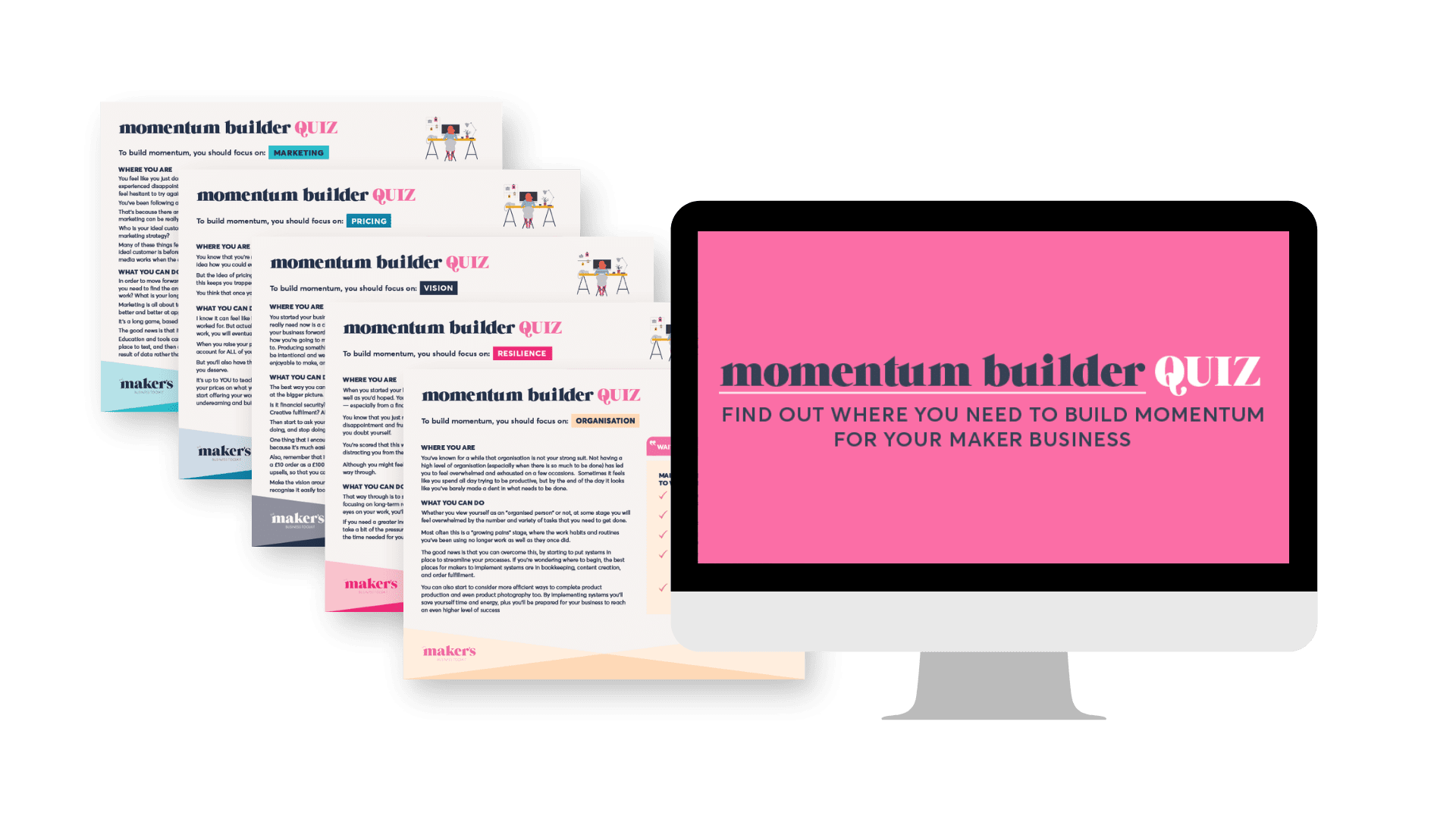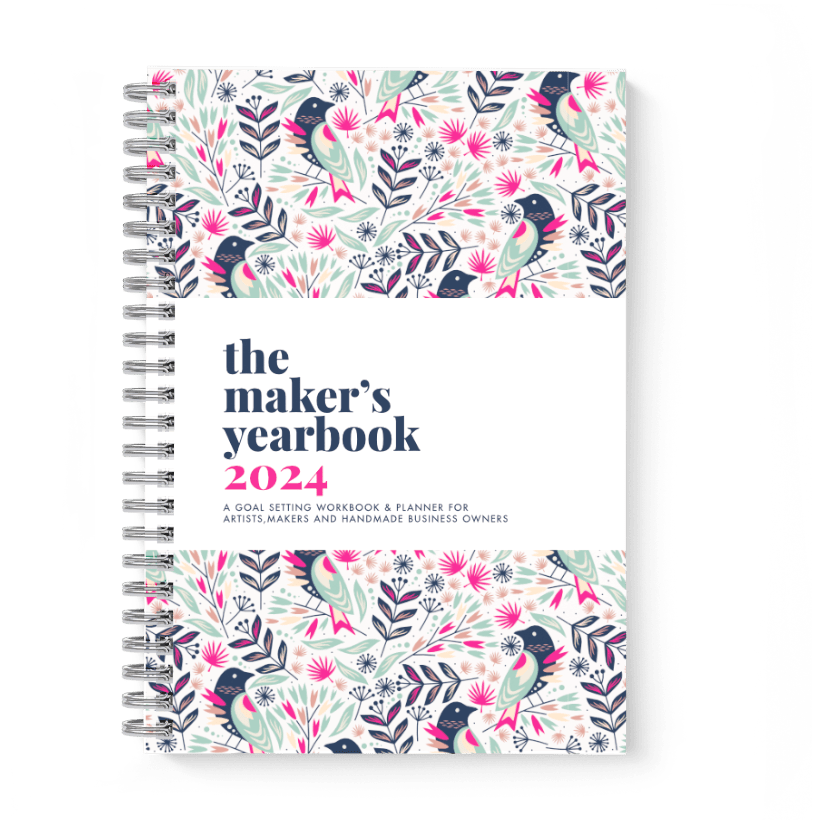I’m guessing you’re feeling pretty exhausted right now.
I’m writing this in December when most of us are on our last legs but even if you’re reading this in February, or June, or October, I’m willing to bet that you’re still tired and pretty stressed out.
Maybe you’re struggling for sales and it feels like such a constant uphill battle to get your business off the ground. Maybe your business is growing and you’re struggling to cope with the extra work without help. Maybe you’re struggling to manage your cashflow, always feeling that you’re walking a tightrope of managing the money going out and coming in.
When you’re in the middle of a stressful situation it can be tempting to focus on just that one thing that will make it all better. More orders, more help, more money.
But the truth is that, once you clear that hurdle there will be another waiting for you.
If you’re ever heard the phrase “New level, new devil” then I know you know what I’m talking about.
Every challenge you complete, every obstacle you overcome, brings something new to worry about and stress about and work on endlessly. So when you push yourself to the brink just to get past this one problem, you leave yourself with nothing to give to the next one.
We spend so much of our time learning our craft. We might even have spent some time putting together a business plan. But how many of us have a plan in place to be able to manage the ups and downs of running a business?
I’m guessing that it’s not many of us.

Many makers just slide into running a business. We start off making just for ourselves, perhaps we decide to try and sell a few of our products at a local craft fair or on Etsy, maybe we end up with our work in a couple of shops and galleries. Before we know if we’re running a business.
Maybe we quit our jobs or maybe we get made redundant and decide to make a go of it rather than going back to the office world.
It’s really fantastic that there are so many opportunities for makers to earn a living from the things they make, but it can mean that we get into business without a solid foundation and without a plan for the long term
Despite my business background I’m as guilty of this as anyone else. And the reason that it happens is that we’re doing this all on our own, and most of the time we’re completely overwhelmed with everything that needs to be done right now.
We simply don’t have time to think about how we’ll handle tomorrow’s challenges because it’s taking all our time and energy to focus on today’s challenges.
Planning just seems like busywork that will just take even more time. Maybe you even think that planning isn’t compatible with creativity.
But planning isn’t about trying to shoehorn more work into the time available. Planning is about focusing on the things that really matter, and the things that really make the difference.
Planning is about doing less, rather than doing more.
Without the focus that planning can give you, it’s easy to look back in a year’s time and realise that you’ve spent a lot of time on things that don’t matter and don’t work.
Here are some of my suggestions for using planning to give yourself more freedom, more peace of mind and more control over your business and your life.
1. Planning your marketing
This all comes down to knowing who your customer is and where you can find them. If you’ve ever tried to create a customer profile for your most likely buyer you’ll know how uncomfortable it can be. A lot of it feels like guessing, you end up either being too specific or not specific enough and you wonder if it’s all just a silly exercise.
But there is a reason that this exercise is included in EVERY SINGLE CLASS OR COURSE ON MARKETING.
It’s included because it’s absolutely vital and it saves you so much unnecessary work.
As one person businesses we need to make sure that we spend our time on the things that really make a difference to our sales, our profits and our happiness.
Without knowing who your customer is you’ll be tempted to spend time and money on advertising and social media that is never going to be effective.
You’ll waste so much time standing in the cold at craft fairs that aren’t going to work for you. You won’t know which marketing channels will work best to attract your ideal customers, so you’ll try to do everything. You’ll have work sitting in shops & galleries (maybe on Sale or Return) that are unlikely to sell it or you’ll spend time pitching to shops that aren’t a good fit.
That’s why gathering as much information as possible about your customers is so important. It allows you to find more people like them, more quickly. It allows you to do less marketing (hallelujah) and make more money. It allows you to spend time with your family, rather than updating your ten social media profiles.
When you’re focused on finding and attracting more of your ideal customers, rather than just “marketing” you can get it done a lot quicker and get back to doing something you really love.
2. Planning your cashflow
Are you paying yourself a salary right now? Is it enough to live on? Is it minimum wage? Less?
Cashflow is one of the biggest challenges for any business and managing it is a skill we need to develop if we want to have a healthy business.
I always remember a classic line from Theo Paphitis on Dragon’s Den because it sounds so much like something my Dad would say.
He said:
“Poor profitability is like cancer, it will kill you slowly. But cashflow is like a heart attack, it will kill you in an instant.”
Managing cashflow crises is another area that can take up significant time, and create tremendous psychological stress as you worry about paying the bills.
While it’s almost impossible to avoid cashflow problems completely, actively managing your money is the best way to navigate through them without losing your business and your mind.
The best resource I have to share on this is Mike Michalowicz’s book Profit First. It recommends a system to help you separate all money that comes into your business bank account into different buckets so that you’re always saving for taxes, your own pay and for unexpected bills.
You can easily implement a simplified version of his system by putting aside some of your income each week. Youneedabudget.com is another great resource for managing cashflow.
Some other cashflow planning you might want to think about:
- Asking customers to put down a deposit on large pieces before you purchase materials or start work.
- Don’t offer 30 day credit terms unless asked and then only with wholesale customers that have a good history of paying on time.
- Negotiate terms with your vendors.
- Test new products before making large amounts or committing large sums of money.
3. Planning your time for marketing, making and admin
Are you actively planning how much time each week you’ll spend on making and how much you’ll spend on marketing and the admin of running your business?
If you’re not then you can easily find yourself in a cycle of feast or famine where you find yourself overwhelmed with orders after a big marketing campaign and put off doing any other marketing for the future while you catch up on orders. Then the orders dry up and you need to do a big marketing push and the cycle repeats itself.
This is a very uncomfortable place to be as you’re constantly stressed, either about being able to keep up with orders or about having no orders in your pipeline.
Businesses that spend dedicated time on sales and marketing each week grow much faster than those that don’t. And if you have a focused customer profile, you can ensure that those two days a week are spent on the things that can make the most difference to your business.
A consistent schedule, that keeps making separate from marketing and marketing separate from admin can ensure that you don’t waste a lot of time on multitasking (find out how much time that wastes here).
Batching your responses to customers can also save a lot of time. I try to respond to queries once or twice a day and stay out of my inbox in between.
4. Planning your time for rest and relaxation
This is a big one for us small business owners.
We neglect ourselves too often, believing that if we can just work a bit harder or a bit longer then we’ll get to where we want to be.
But each stage of business comes with its own challenges and there’s always something that needs attention. It’s a marathon, rather than a sprint and we need to prioritise our health, our motivation and our optimism.
The constant uncertainty of running a business places a lot of stress on our shoulders and years of chronic stress can lead to numerous health problems, both physical and mental.
Stress makes us make poor decisions, it makes us sloppy with our work and it makes us overemotional.
Suddenly we can’t see the things that are right in front of us. We can’t see why our business isn’t performing, even though it might be clear to others, and we cling to our established ways of doing things even when it’s clear that something needs to change.
Often the first thing that needs to change is us. And sometimes that change can be something as simple as taking the time to get some exercise, to eat a lunch in peace or to stop working at a reasonable hour.
Your body and mind need time to rest and recover and sometimes you’ll find the answers aren’t quite so difficult to spot when you’re well rested, well fed, well and just generally…..well.








